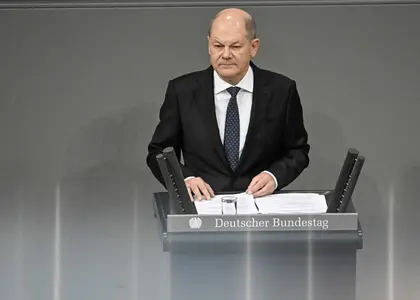German Chancellor Olaf Scholz said Tuesday that military and financial support for Ukraine was of “existential importance” to Europe, defending defence spending commitments as Berlin confronts a domestic budget crisis.
Germany has been one of the Ukraine’s biggest backers along with the United States, Scholz said, supplying Kyiv with weapons to battle Russia’s invading forces.
JOIN US ON TELEGRAM
Follow our coverage of the war on the @Kyivpost_official.
“We will continue with this support as long as it is necessary,” Scholz said in a speech to parliament.
“This support is of existential importance. For Ukraine... but also for us in Europe.
“None of us want to imagine what even more serious consequences it would have for us if Putin won this war,” Scholz said.
The chancellor was addressing MPs following a shock constitutional court ruling earlier this month, which blew a massive hole in the government’s spending plans.
Germany’s top court said the government had flouted a constitutional debt rule, which limits new borrowing to 0.35 percent of gross domestic product.
The ruling has left the government scrambling to pass a new budget before the end of the year and shore up sorely needed investments in decarbonisation and the modernisation of its armed forces.
To quell the immediate crisis, the government plans to suspend the constitutional debt rule for a fourth year in a row.
The so-called debt brake was already lifted between 2020 and 2022 to tackle the crises caused by the coronavirus pandemic and the spike in energy prices following Russia’s invasion of Ukraine last year.

Trump Makes 90 Day Foreign Aid Freeze – Ukraine Military Support Supposedly Untouched
Germany had supported households and businesses manage soaring bills with billions of euros in support, Scholz said.
But it was “not enough to look only at the winter of 2022-2023,” Scholz said, when energy prices were high.
“It was always about winter of 2023-2024,” Scholz said, sketching a continuing crisis which could justify lifting the debt brake again.
“Under no circumstances should we let up in our support for Ukraine and in overcoming the energy crisis,” Scholz said.
“That would not be responsible, that would endanger our future.”
You can also highlight the text and press Ctrl + Enter










